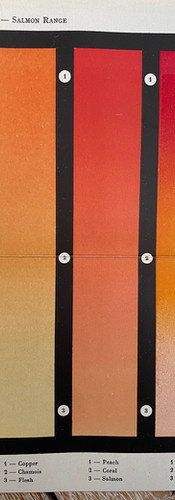By Di Durston, Tea Bag PRHRiA
By accident, I found a collection of chromolithographs included in the index of coloured plates from an antiquarian journal that I bought in 1995. Never dreaming at the time that this list would be of interest, however, it was indispensable when I began to research old roses.

"The Garden" weekly journal, Vol LIV October 22, 1898, compiled by visionary 19th century Irish gardener and writer William Robinson.
Gill Teague was the owner of Florilegium, the only specialist garden bookshop in Australia. Florilegium was the bookseller invited to the 2nd HRIA Conference held in Orange, NSW. The year was 1995 and it was my first rose conference. Gill had stacks of antiquarian books to sell on trestles in the side alcove along with all the other rose related treasures for sale. This is where I bought my one copy of "The Garden" dated 1898. The previous owner of the journal was from Wellington, New Zealand, from the Philosophical Society. Another book that I found on the tables was "The Rose Annual" by J.H. Nicolas, 1930, more on these later.
The lectures were held in a community hall that was also used for country dancing and I vividly
remember there were highly polished wooden floor boards. One of the late-comers made a
grand entrance on the shiny floor when her heels slid from under her while moving too fast to find
a spare seat, luckily there was no harm done.
The theme of this conference was wild Species Roses. Peter Cox was an expert, and he grew fifty five species roses in large pots to decorate the country hall. This conference was full of country charm and welcoming excitement. Roger Phillips from UK and Bill Grant from California were the overseas lecturers. Susan Irvine, Judith McLeod and Trevor Nottle represented Australia, all presented wonderful lectures.
While researching for the Tea Rose book I decided out of curiosity to source some of the rose
plates from “The Garden” and archived at the Lindley Library in London. I had read in Nancy
Steen’s book that this was her ‘go to’ place for information on all old rose related information. So
I gave it a try. To my amazement I was able to correspond with the research team for about four
years.
My good friend Judy from Glen Forrest was holidaying with her girlfriend who lived near the
Vincent Square RHS and she offered to collect a bundle of plates for me that had been copied.
Some of these are in our Tea Rose book and others have been helpful with identifying misnamed
roses. The plates that I have chosen for this blog article show how tricky it is to identify, with
certainty, the name of a ‘found’ rose and here are a few pink Tea Roses for you to see.
Click on the image to enlarge.
The book by A.J. Nicolas was the other book that I was able to source colour plates that are the
work of Mons. Jules Gravereaux. I quote from the colour chapter of the Nicolas book. “The
Gravereaux system has four major ranges beside white: Yellow, Salmon, Pink and Red. Each
range is divided into three series; each grading in tone from the darkest to the lightest, is
subdivided into three standard named colours”. These plates are also in the Tea Rose book.
Over the years Gill Teague and his Florilegium Book Shop and I became great friends. His
catalogues were fabulous reading, with the rose section always enticing me to buy yet another
book and kept me always waiting for the next catalogue to read from cover to cover. I believe that
my most important purchase from Florilegium was “The Garden Journal” dated 1898. Florilegium
ceased trading in 2020 and the remaining books were sent to Wychwood in Tasmania.
I hope you enjoy several of these precious chromolithographs shown below. To make the image larger, just touch/click on them.














How wonderful to come across this information again. Very interesting.